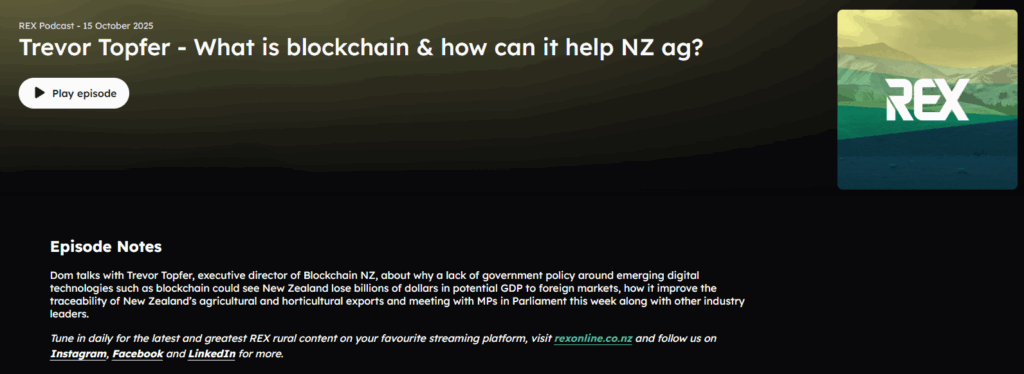Blockchain Technology New Zealand Experts Warn Policy Vacuum Could Cost Billions
Industry leaders warn that without clear direction on blockchain technology, New Zealand could lose billions of dollars in potential GDP to overseas markets. The absence of a national policy on emerging digital technologies is prompting members of the sector to meet MPs in Wellington this week to push for a coordinated government response and position the country as a credible global player in blockchain innovation.
Call for Leadership on Blockchain Technology in New Zealand
Experts say the development of a clear regulatory framework could unlock significant value for the country’s primary industries. The technology can transform how producers verify origin, trace supply chains and demonstrate ethical and environmental credentials to international consumers. These are areas where transparency drives export premiums and builds long-term trust with buyers in key global markets.
Blockchain functions as a secure digital ledger that stores identical copies of data across thousands of computers worldwide, making it almost impossible to manipulate. This decentralised system enables exporters to prove authenticity and sustainability credentials in real time. For New Zealand’s producers, this could determine whether they command a premium price or lose ground to overseas competitors already using the technology to demonstrate transparency.

Potential for Blockchain to Strengthen the Economy
The financial potential of blockchain technology in New Zealand is significant. Industry experts believe the sector could grow into one of the country’s largest export earners within five years if supported by appropriate policy and regulation. The technology’s ability to track goods from origin to consumer is especially valuable for New Zealand’s meat, dairy, wine, kiwifruit and manuka honey exports, which rely heavily on authenticity and traceability to maintain international reputation.
Outside agriculture, blockchain offers major benefits for financial services by reducing transaction costs and accelerating payments between businesses and consumers. It can also underpin digital identity systems, enable carbon credit trading, automate logistics contracts and allow secure management of health records. Each of these uses could increase efficiency and improve oversight in both private and public sectors.
Inaction Could Push Jobs and Investment Offshore
Trevor Topfer, executive director of Blockchain NZ, says New Zealand risks becoming a technology importer rather than a creator. “Hong Kong announced its stablecoin framework and attracted $11.7 billion in investment within a month. Singapore drew almost $11 billion last year and Australia expects 200,000 blockchain related jobs by 2030,” he says.
“If we do not act soon, we will end up importing innovation instead of exporting it. The internet is being rebuilt using blockchain and New Zealand cannot afford to sit on the sidelines.”
Topfer says blockchain’s tamper proof transparency can revolutionise how products are verified. “Imagine tracing a Gisborne sheep’s wool from the farm gate to a Paris fashion label with every step verified instantly. That is the kind of high value opportunity New Zealand producers could access if policy kept pace with technology.”
Unclear Regulation Stifling Innovation
Local blockchain companies currently face uncertainty because government agencies have not yet defined how digital assets fit within financial and commercial law. “Offshore, regulators give startups clarity that attracts capital. Here the ambiguity is costing us businesses, talent and tax revenue,” says Topfer.
Most of New Zealand’s nine billion dollars in annual digital asset trading already occurs on offshore platforms, representing a significant loss of local value and oversight.
Industry Push for Policy and Collaboration
Paul Quickenden, Easy Crypto New Zealand general manager and member of Blockchain NZ, says closer collaboration between industry and government could accelerate progress. “A stablecoin backed by the New Zealand dollar would strengthen monetary sovereignty, improve exporter payments and reduce reliance on offshore platforms,” he says.
Quickenden says the country has an opportunity to set a global standard for how digital assets are safely integrated into the economy. “We can define clear categories for stablecoins, NFTs and tokenised property so that advisers and investors can operate confidently within a transparent regulatory system. That would future proof our financial markets and encourage responsible innovation.”

Cross Agency Coordination Needed
Topfer says fragmented responsibility across government departments is slowing progress. “Commerce, Treasury and Agriculture all have a role but no single agency is leading. We need one authority that looks across departments and coordinates policy through a digital asset lens.”
The newly formed Parliamentary Digital Assets Working Group will meet ministers and regulators this week to improve understanding of blockchain applications and ensure consistent policy development across election cycles.
Positioning New Zealand as a Trusted Blockchain Hub
Topfer believes New Zealand’s reputation for trust and good governance gives it a unique advantage. “We could position ourselves as the safe and compliant home of blockchain innovation, much like our 100 Percent Pure campaign did for tourism. With the right framework we can attract world leading developers and investors who value stability and integrity.”
The story has been featured by national media including 1News and Stuff, showing growing awareness of how blockchain could reshape New Zealand’s export economy.
About Impact PR
As one of the top PR agencies New Zealand businesses rely on for technology and innovation communication, Impact PR helps brands translate complex technical topics such as blockchain technology New Zealand crypto industry and the digital assets sector into powerful media narratives. The agency works with fintech, blockchain and digital transformation companies to build credibility, educate audiences and foster investor confidence. Its expertise extends to policy communication and stakeholder engagement for organisations at the cutting edge of the technology sector. Impact PR has supported brands in launching financial platforms, AI tools and software innovations that are shaping the next phase of the digital economy.
Learn more about blockchain technology from the World Economic Forum.
